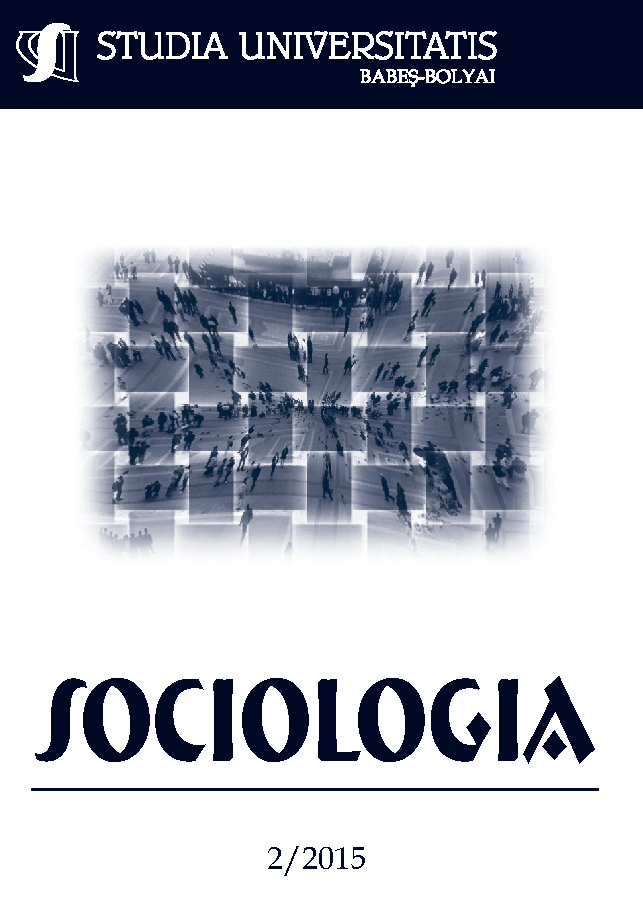REFLECTED BODIES: WOMEN’S PERSPECTIVES ON THE MARITAL EXPERIENCE AND THE TRANSFORMATION OF THE MATERNAL BODY. A CASE STUDY OF MIDDLE-CLASS WOMEN IN SUBURBAN ROMANIA
Keywords:
marriage, motherhood, experience, embodiment, intimacyAbstract
Even if concepts of marriage and motherhood are subject to continuous changes and reinterpretations, women and men still marry and have children following more traditional or more unconventional patterns. My major interest in this research was to unveil Romanian middle-class women’s narratives regarding their perceptions over their own bodies and identities, by focusing my analysis on lived experiences, intimate scenes, daily practices and activities within marriage and motherhood. Qualitative empirical work was conducted in 2012 and 2015 in a post-socialist suburban neighbourhood, known as a place mostly inhabited by young, middle-class families. The analysis unfolds women’s class affinities and dispositions, their perception of the marital experience, identity and corporeal transformations, and their reflections on maternity as a transformative stage in terms of subjectivity, agency and body.
References
Bailey, L. (1999). Refracted Selves? A Study of Changes in Self-Identity in the Transition to Motherhood. Sociology, 33(2):335-352.
Barad, K. (2003). Posthumanist Performativity: Toward an Understanding of How Matter Comes to Matter. Signs, 28(3): 801-831.
Biddle, J. (1997). Shame. Australian Feminist Studies, 12(26):227-239. Bordo, S. (2003 [1993]). Unbearable Weight. Feminism, Western Culture, and the Body (10th anniversary edition). Berkeley: University of California Press. Brook, H. (2002). Rethinking the politics of marriage. Feminist Theory, 3(1):45-66.
Butler, J. (1993). Bodies That Matter. London: Routledge.
Gog, S. (2006). The construction of the religious space in post-socialist Romania. Journal for the Study of Religion and Ideologies, (15): 37-53.
Grosz, E. (1994). Volatile Bodies. Towards a Corporeal Feminism. Indiana: Indiana University Press.
Harding, S. (1993). Rethinking Standpoint Epistemology. What is “,Strong Objectivity”? In L. Alcoff and E. Potter (eds.): Feminist Epistemologies (Thinking Gender). London: Routledge, pp. 49-60. Harding, S. (2004). Introduction: Standpoint Theory as a Site of Political, Philosophic, and Scientific Debate.. In S. Harding (ed.): . The Feminist Standpoint Theory Reader. Intellectual and Political Controversies. London: Routledge, pp. 1-15.
Hartmann, H. (1981 [1997]). The Unhappy Marriage of Marxism and Feminism. Towards a More Progressive Union. In L Nicholson (ed.): The Second Wave. A reader in Feminist Theory. London: Routledge, pp. 97-122.
Haynes, K. (2008). (Re)figuring accounting and the maternal bodies: The gendered embodiment of accounting professionals. Accounting, Organizations and Society. 33: 328-348.
Kligman, G. (1998). The politics of duplicity, Controlling reproduction in Ceausescu’s Romania. Berkeley: University of California Press.
Lambevsky, S. A. (2005). Bodies, Schizo-Vibes and Hallucinatory Desires - Sexualities in Movement. Sexualities, 8(5):570-586.
Miller, T. (2007). “IS THIS WHAT MOTHERHOOD IS ALL ABOUT?’’ Weaving Experiences and Discourses through Transition to First-Time Motherhood. Gender and Society, 21(3): 337-358.
Noll, S. and Fredrickson, B. (1998). A Mediational Model Linking Self-Objectification, Body Shame, and Disordered Eating. Psychology of Women Quarterly, 22: 623-636.
Okin, S. M.. (1999). Justice, Gender, and the Family. In J. Kourany, J. Sterba and R. Tong (eds.): Feminist Philosophies (2nd edition). Prentice Hall, pp. 313-331.
Sedgwick, E. (2003). Shame, Theatricality, And Queer Performativity: Henry James’s The Art of the Novel. In E. Kosofsky Sedgwick and A. Frank (eds.): Touching Feeling: Affect, Pedagogy, Performativity. Durham : Duke University Press, pp. 35-67.
Stone, A. (2014). Psychoanalysis and Maternal Subjectivity. In P. Bueskens (ed.): Mothering and Psychoanalysis: Clinical, Sociological and Feminist Perspectives. Bradford: Demeter Press.
Svendsen, M. (1996). The Body as a Business Card. How to Become a Modern Woman in Urban Romania. In M. Feischmidt, E. Vincze-Magyari, and V. Zentai (eds.): Women and Men in East European Transition. Cluj-Napoca: Editura Fundatiei Pentru Studii Europene.
Tomkins, S. (2008 [1962, 1963, 1991]). Affect Imagery Consciousness: The Complete Edition. New York: Springer Publishing Company.
Downloads
Published
How to Cite
Issue
Section
License
Copyright (c) 2015 Studia Universitatis Babeș-Bolyai Sociologia

This work is licensed under a Creative Commons Attribution-NonCommercial-NoDerivatives 4.0 International License.



